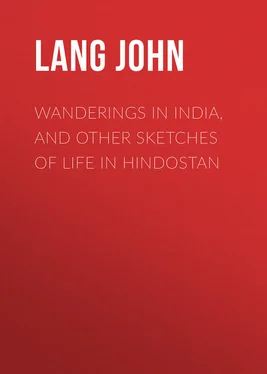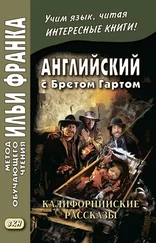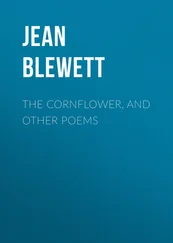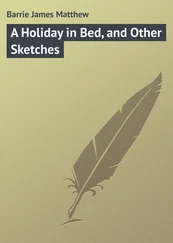John Lang - Wanderings in India, and Other Sketches of Life in Hindostan
Здесь есть возможность читать онлайн «John Lang - Wanderings in India, and Other Sketches of Life in Hindostan» — ознакомительный отрывок электронной книги совершенно бесплатно, а после прочтения отрывка купить полную версию. В некоторых случаях можно слушать аудио, скачать через торрент в формате fb2 и присутствует краткое содержание. Жанр: literature_19, foreign_antique, foreign_prose, Путешествия и география, на английском языке. Описание произведения, (предисловие) а так же отзывы посетителей доступны на портале библиотеки ЛибКат.
- Название:Wanderings in India, and Other Sketches of Life in Hindostan
- Автор:
- Жанр:
- Год:неизвестен
- ISBN:нет данных
- Рейтинг книги:3 / 5. Голосов: 1
-
Избранное:Добавить в избранное
- Отзывы:
-
Ваша оценка:
- 60
- 1
- 2
- 3
- 4
- 5
Wanderings in India, and Other Sketches of Life in Hindostan: краткое содержание, описание и аннотация
Предлагаем к чтению аннотацию, описание, краткое содержание или предисловие (зависит от того, что написал сам автор книги «Wanderings in India, and Other Sketches of Life in Hindostan»). Если вы не нашли необходимую информацию о книге — напишите в комментариях, мы постараемся отыскать её.
Wanderings in India, and Other Sketches of Life in Hindostan — читать онлайн ознакомительный отрывок
Ниже представлен текст книги, разбитый по страницам. Система сохранения места последней прочитанной страницы, позволяет с удобством читать онлайн бесплатно книгу «Wanderings in India, and Other Sketches of Life in Hindostan», без необходимости каждый раз заново искать на чём Вы остановились. Поставьте закладку, и сможете в любой момент перейти на страницу, на которой закончили чтение.
Интервал:
Закладка:
This is the first time that the Himalaya mountains have listened to the joyous sound of music. We have danced to music within doors; but never, until this day, have we heard a band in the open air in the Himalaya mountains. How wonderful is the effect! From valley to valley echo carries the sound, until at last it seems as though
Every mountain now had found a band.
Long after the strain has ceased with us, we can hear it penetrating into and reverberating amidst regions which the foot of man has never yet trodden, and probably will never tread. The sun has gone down, but his light is still with us.
Back to the club! Dinner is served. We sit down, seventy-five of us. The fare is excellent, and the champagne has been iced in the hail which fell the other night, during a storm. Jack Apsley is on my right, and I have thrice begged of him to remember that he must not stay later than half-past twelve; and he has thrice responded that Mary has given him an extension of leave until daylight. Jack and I were midshipmen together, some years ago, in a line-of-battle ship that went by the name of the House of Correction. And there is Wywell sitting opposite to us – Wywell who was in the frigate which belonged to our squadron – the squadron that went round the world, and buried the commodore, poor old Sir James! in Sydney churchyard. Fancy we three meeting again in the Himalaya mountains!
The cloth is removed, for the dinner is over. The president of the club – the gentleman who founded it – rises. He is a very little man of seventy years of age – fifty-three of which have been spent in India. He is far from feeble, and is in full possession of all his faculties. His voice is not loud, but it is very distinct, and pierces the ear.
They do not sit long after dinner at the club. It is only nine, and the members are already diminishing. Some are off to the billiard-room, to smoke, drink brandy-and-water, and look on at the play. The whist parties are now at work, and seven men are engaged at brag. A few remain; and, drawing their chairs to the fireplace, form a ring and chat cosily.
Halloa! what is this? The club-house is heaving and pitching like a ship at anchor in a gale of wind. Some of us feel qualmish. It is a shock of an earthquake; and a very violent shock. It is now midnight. A thunderstorm is about to sweep over Mussoorie. Only look at that lurid forked lightning striking yonder hill, and listen to that thunder! While the storm lasts, the thunder will never for a second cease roaring; for, long before the sound of one peal has died away, it will be succeeded by another more awful. And now, look at the Dhoon! Those millions of acres are illuminated by incessant sheet lightning. How plainly we discern the trees and the streams in the Dhoon, and the outline of the pass which divides the Dhoon from the plains. What a glorious panorama! We can see the black clouds descending rapidly towards the Dhoon, and it is not until they near that level land that they discharge the heavy showers with which they are laden. What a luxury would this storm be to the inhabitants of the plains; but it does not extend beyond the Dhoon. We shall hear the day after to-morrow that not a single drop of rain has fallen at Umballah, Meerut, or Saharunpore.
The party from the billiard-room has come up to have supper, now that the storm is over. They are rather noisy; but the card-players take no heed of them. They are too intent upon their play to be disturbed. Two or three of the brag party call for oyster-toast to be taken to the table, and they devour it savagely while the cards are dealt round, placing their lighted cheroots meanwhile on the edge of the table.
And now there is singing – comic and sentimental. "Isle of Beauty" is followed by the "Steam Leg," the "Steam Leg" by the "Queen of the May," the "Queen of the May" by the facetious version of "George Barnwell," and so on. Jack Apsley – who has ascertained that dear Mary is quite safe, and not at all alarmed – is still here, and is now singing "Rule, Britannia," with an energy and enthusiasm which are at once both pleasing and ridiculous to behold. He has been a soldier for upwards of sixteen years; but the sailor still predominates in his nature; while his similes have invariably reference to matters connected with ships and the sea. He told me just now, that when he first joined his regiment, he felt as much out of his element as a live dolphin in a sentry-box, and he has just described his present colonel as a man who is as touchy as a boatswain's kitten. Apsley's Christian name is Francis, but he has always been called Jack, and always will be.
It is now broad daylight, and high time for a man on sick-leave to be in bed. How seedy and disreputable we all look, in our evening dresses and patent-leather boots. And observe this carnation in my button-hole – the gift of Mrs. Apsley; she gave it to me on the mall. The glare of the lights, and the atmosphere of smoke in which I have been sitting part of the night, have robbed it of its freshness, its bloom, and perfume. I am sorry to say it is an emblem of most of us.
Go home, Apsley! Go home, reeking of tobacco-smoke and brandy-and-water – with your eyes like boiled gooseberries, your hair in frightful disorder – go home! You will probably meet upon the mall your three beautiful children, with their rosy faces all bloom, and their breath, when they press their glowing lips to those feverish cheeks of yours, will smell as incense, and make you ashamed of yourself. Go home, Jack. I will tiff with you to-day at half-past two.
Two young gentlemen were victimized last night at the brag party. The one, a lieutenant of the N. I. Buffs, lost six thousand rupees; the other, a lieutenant of the Foot Artillery, four thousand. The day after to-morrow, the first of the month, will be settling day. How are they to meet these debts of honour? They have nothing but their pay, and must borrow from the banks. That is easily managed. The money will be advanced to them on their own personal security, and that of two other officers in the service. They must also insure their lives. The premium and the interest together will make them forfeit fourteen per cent. per annum on the sum advanced. The loan will be paid off in three years, by monthly instalments. The paymaster will receive an order from the bank secretary to deduct for the bank so much per mensem from their pay. For the next three years they will have to live very mildly indeed.
There were also two victims (both youngsters) to billiards. One lost three thousand rupees in bets, another two thousand five hundred by bad play. They too, will have to fly for assistance to the banks. Captains Locke and Bunyan won, between them, last night, one thousand four hundred pounds. There was but little execution done at whist. Not more than one hundred and fifty pounds changed hands. Those four men who play regularly together, and who never exceed their usual bets, have very little difference between them at the end of each month – not thirty pounds either way. This will not hurt them; for they have all good appointments, and have private property besides.
I find, on going to tiffin at Jack Apsley's, that Mrs. Jack has heard all about the winnings and losings at the club. Some man went home and told his wife, and she has told everybody whom she has seen. In a short time the news will travel to head-quarters at Simlah, and out will come a general order on gambling, which general order will be read aloud at the Himalaya Club, with comments by the whole company – comments which will be received with shouts of laughter. Some youngsters will put the general order into verse, and send it to a newspaper. This done, the general order will be converted into pipe-lights. This is no doubt very sad; but I have no time to moralize. My duty is simply to paint the picture.
Читать дальшеИнтервал:
Закладка:
Похожие книги на «Wanderings in India, and Other Sketches of Life in Hindostan»
Представляем Вашему вниманию похожие книги на «Wanderings in India, and Other Sketches of Life in Hindostan» списком для выбора. Мы отобрали схожую по названию и смыслу литературу в надежде предоставить читателям больше вариантов отыскать новые, интересные, ещё непрочитанные произведения.
Обсуждение, отзывы о книге «Wanderings in India, and Other Sketches of Life in Hindostan» и просто собственные мнения читателей. Оставьте ваши комментарии, напишите, что Вы думаете о произведении, его смысле или главных героях. Укажите что конкретно понравилось, а что нет, и почему Вы так считаете.












